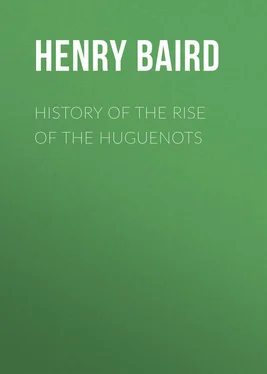Henry Baird - History of the Rise of the Huguenots
Здесь есть возможность читать онлайн «Henry Baird - History of the Rise of the Huguenots» — ознакомительный отрывок электронной книги совершенно бесплатно, а после прочтения отрывка купить полную версию. В некоторых случаях можно слушать аудио, скачать через торрент в формате fb2 и присутствует краткое содержание. ISBN: , Жанр: foreign_antique, foreign_prose, на английском языке. Описание произведения, (предисловие) а так же отзывы посетителей доступны на портале библиотеки ЛибКат.
- Название:History of the Rise of the Huguenots
- Автор:
- Жанр:
- Год:неизвестен
- ISBN:http://www.gutenberg.org/ebooks/30708
- Рейтинг книги:4 / 5. Голосов: 1
-
Избранное:Добавить в избранное
- Отзывы:
-
Ваша оценка:
- 80
- 1
- 2
- 3
- 4
- 5
History of the Rise of the Huguenots: краткое содержание, описание и аннотация
Предлагаем к чтению аннотацию, описание, краткое содержание или предисловие (зависит от того, что написал сам автор книги «History of the Rise of the Huguenots»). Если вы не нашли необходимую информацию о книге — напишите в комментариях, мы постараемся отыскать её.
History of the Rise of the Huguenots — читать онлайн ознакомительный отрывок
Ниже представлен текст книги, разбитый по страницам. Система сохранения места последней прочитанной страницы, позволяет с удобством читать онлайн бесплатно книгу «History of the Rise of the Huguenots», без необходимости каждый раз заново искать на чём Вы остановились. Поставьте закладку, и сможете в любой момент перейти на страницу, на которой закончили чтение.
Интервал:
Закладка:
So slowly did news travel in the sixteenth century, that it was not until the eighteenth of February, 1566, that Forquevaulx, from Madrid, despatched to the King of France a first account of the events that had occurred in Florida nearly five months before. The ambassador seems to have expressed becoming indignation in the interviews he sought with the Duke of Alva, repudiating with dignity the suggestion that the blame should be laid upon Coligny, for having abused his authority as admiral to set on foot a piratical expedition into the territories of a friendly prince; and holding forth no encouragement to believe that Charles would disavow Coligny's acts. He told Alva distinctly that Menendez was a butcher rather than a good soldier ("plus digne bourreau que bon soldat," Forquevaulx to Charles IX., March 16, 1566, Gaffarel, 425). He declared to him that the Turks had never exhibited such inhumanity to their prisoners at Castelnovo or at Gerbes – in fact, never had barbarians displayed such cruelty. As a Frenchman, he assured the Spaniard that he shuddered when he thought of so execrable a deed, and that it appeared to him that God would not leave it unpunished (Ibid., 426).
Catharine's own language to the Spanish ambassador, Don Francez de Alava, was not less frank. "As their common mother," she said, "I can but have an incredible grief at heart, when I hear that between princes so closely bound as friends, allies, and relations, as these two kings, and in so good a peace, and at a time when such great offices of friendship are observed between them, so horrible a carnage has been committed on the subjects of my son, the King of France. I am, as it were, beside myself when I think of it, and cannot persuade myself that the king, your master, will refuse us satisfaction" (Catharine to Forquevaulx, Moulins, March 17th, Gaffarel, 427). Not content with this plain talking to Alava, she "prayed and ordered" Forquevaulx to make Philip himself understand her desires respecting "the reparation demanded by so enormous an outrage ." He was to tell his Catholic Majesty that Catharine would never rest content until due satisfaction was made; and that she would feel "marvellous regret" should she not only find that all her pains to establish perpetual friendship between the two kings had been lost, but one day be reproached by Charles for having suffered such a stain upon his reputation ("que … j'aye laissé faire une telle escorne à sa reputation." Gaffarel, 429).
Forquevaulx fulfilled his instructions to the very letter, adding, on his own account, that in forty-one years of military service he had never known so execrable an execution. He seems also to have disposed effectually of the Spanish claim to Florida through right of ancient discovery, by emphasizing the circumstance that Menendez, after his victory, thought it necessary to take formal possession of the land. He informed Philip that no news could be more welcome to the Huguenots than that the subjects of Charles had been murdered by those very persons who were expected to strengthen him by their friendship and alliance (Forquevaulx to Catharine, April 9th, Gaffarel, 432). His words had little effect upon any one at the Spanish court, save the young queen, who felt the utmost solicitude lest her brother and her husband should become involved in war with each other. ("Me sembla qu'il tint à peu qu'elle ne pleurast son soul de crainte qu'il ne survienne quelque alteration." Forquevaulx, ubi supra , 430.)
But, although no progress was made toward obtaining justice, the French government did not relax its efforts. Charles wrote from Saint Maur, May 12, 1566, that his will was that Forquevaulx should renew his complaint and insist with all urgency upon a reparation of the wrong done him. "You will not cease to tell them," said the king, "that they must not hope that I shall ever be satisfied until I see such a reparation as our friendship demands." (Gaffarel, 437.)
Sanguinary revenge of De Gourgues, April, 1568.
The French ambassador continued to press his claim, and, in particular, to demand the release of the French prisoners, even up to near the time when a private citizen, Dominique de Gourgues, undertook to avenge his country's wrongs while satisfying his thirst for personal revenge. De Gourgues was not, as has usually been supposed, a Huguenot; he had even been an adherent of Montluc and of the house of Guise (Gaffarel, 265). But, having been captured in war by the Spaniards, in 1566, he had been made a galley-slave. From that time he had vowed irreconcilable hatred against the Catholic king. He obtained a long-deferred satisfaction when, in April, 1568, he surprised the fort of Caroline, slew most of the Spanish soldiers, and placed over the remainder – spared only for the more ignominious punishment of hanging upon the same trees to which Huguenots had been suspended – the inscription, burned with a hot iron on a pine slab: "I do this not as to Spaniards, nor as to seamen, but as to traitors, robbers, and murderers." (The words are given with slight variations. See "La Reprinse de la Floride par le Cappitaine Gourgue," reprinted by Gaffarel, 483-515; Agrippa d'Aubigné, i. 354-356; De Thou, iv. 123-126.)
CHAPTER XV.
THE SECOND CIVIL WAR AND THE SHORT PEACE
Coligny's pacific counsels.
Rumors of plots to destroy the Huguenots.
D'Andelots warlike counsels prevail.
Cardinal Lorraine to be seized and King Charles liberated.
A treacherous peace or an open war was now apparently the only alternative offered to the Huguenots. In reality, however, they believed themselves to be denied even the unwelcome choice between the two. The threatening preparations made for the purpose of crushing them were indications of coming war, if, indeed, they were not properly to be regarded, according to the view of the great Athenian orator in a somewhat similar case, as the first stage in the war itself. The times called for prompt decision. Within a few weeks three conferences were held at Valéry and at Châtillon. Ten or twelve of the most prominent Huguenot nobles assembled to discuss with the Prince of Condé and Coligny the exigencies of the hour. Twice was the impetuosity of the greater number restrained by the calm persuasion of the admiral. Convinced that the sword is a fearful remedy for political diseases – a remedy that should never be applied except in the most desperate emergency – Coligny urged his friends to be patient, and to show to the world that they were rather forced into war by the malice of their enemies than drawn of their own free choice. But at the third meeting of the chiefs, before the close of the month, they were too much excited by the startling reports reaching them from all sides, to be controlled even by Coligny's prudent advice. A great friend of "the religion" at court had sent to the prince and the admiral an account of a secret meeting of the royal council, at which the imprisonment of the former and the execution of the latter was agreed upon. The Swiss were to be distributed in equal detachments at Paris, Orleans, and Poitiers, and the plan already indicated – the repeal of the Edict of Toleration and the proclamation of another edict of opposite tenor – was at once to be carried into effect. "Are we to wait," asked the more impetuous, "until we be bound hand and foot and dragged to dishonorable death on Parisian scaffolds? Have we forgotten the more than three thousand Huguenots put to violent deaths since the peace, and the frivolous answers and treacherous delays which have been our only satisfaction?" And when some of the leaders expressed the opinion that delay was still preferable to a war that would certainly expose their motives to obloquy, and entail so much unavoidable misery, the admiral's younger brother, D'Andelot, combated with his accustomed vehemence a caution which he regarded as pusillanimous, and pointedly asked its advocates what all their innocence would avail them when once they found themselves in prison and at their enemy's mercy, when they were banished to foreign countries, or were roaming without shelter in the forests and wilds, or were exposed to the barbarous assaults of an infuriated populace. 430 430 The most authentic account of these important interviews is that given by François de la Noue in his Mémoires, chap. xi. It clearly shows how much Davila mistakes in asserting that "the prince, the admiral, and Andelot persuaded them, without further delay, to take arms." (Eng. trans., London, 1678, bk. iv., p. 110.) Davila's careless remark has led many others into the error of making Coligny the advocate, instead of the opposer, of a resort to arms. See also De Thou, iv. (liv. xlii.) 2-7, who bases his narrative on that of De la Noue, as does likewise Agrippa d'Aubigné, l. iv., c. vii. (i. 209), who uses the expression: "L'Amiral voulant endurer toutes extremitez et se confier en l'innocence."
His striking harangue carried the day. The admiral reluctantly yielded, and it was decided to anticipate the attack of the enemy by a bold defensive movement. Some advocated the seizure of Orleans, and counselled that, with this refuge in their possession, negotiations should be entered into with the court for the dismissal of the Swiss; others that the party should fortify itself by the capture of as many cities as possible. But to these propositions the pertinent reply was made that there was no time for wordy discussions, the controversy must be settled by means of the sword; 431 431 "Ains avec le fer."
and that, of a hundred towns the Protestants held at the beginning of the last war, they had found themselves unable to retain a dozen until its close. Finally, the prince and his companions resolved to make it the great object of their endeavors to drive the Cardinal of Lorraine from court and liberate Charles from his pernicious influence. This object was to be attained by dispersing the Swiss, and by conducting hostilities on a bold plan – rather by the maintenance of an army that could actively take the field, 432 432 "Une armée gaillarde." La Noue, ubi supra .
than by seizing any cities save a few of the most important. On the twenty-ninth of September, the feast-day of St. Michael, the Huguenots having suddenly risen in all parts of France, Condé and Coligny, at the head of the troops of the neighboring provinces, were to present themselves at the court, which would be busy celebrating the customary annual ceremonial of the royal order. They would then hand to the king a humble petition for the redress of grievances, for the removal of the Cardinal of Lorraine, and for the dispersion of the Swiss troops, which, instead of being retained near the frontiers of the kingdom which they had ostensibly come to protect, had been advanced to the very vicinity of the capital. 433 433 Mém. de Castelnau, liv. vi., c. iv., c. v.; La Noue, c. xi.; De Thou, iv. (liv. xlii.) 5, 6. Davila, l. iv., p. 110, alludes to the accusation, extorted from Protestant prisoners on the rack, that "the chief scope of this enterprise was to murder the king and queen, with all her other children, that the crown might come to the Prince of Condé," but admits that it was not generally credited. The curate of Saint Barthélemi is less charitable; describing the rising of the Protestants, he says: "En ung vendredy 27e se partirent de toutes les villes de France les huguenots, sans qu'on leur eust dit mot, mais ils craignoient que si on venoit au dessein de leur entreprise qui estoit de prendre ou tuer le roy Charles neuvième, qu'on ne les saccagea ès villes." Journal d'un curé ligueur (J. de la Fosse), 85.
It might be difficult to prevent the enterprise from wearing the appearance of a plot against the king, in whose immediate vicinity the cardinal was; but the event, if prosperous, would demonstrate the integrity of their purpose. 434 434 La Noue, and De Thou, ubi supra .
Интервал:
Закладка:
Похожие книги на «History of the Rise of the Huguenots»
Представляем Вашему вниманию похожие книги на «History of the Rise of the Huguenots» списком для выбора. Мы отобрали схожую по названию и смыслу литературу в надежде предоставить читателям больше вариантов отыскать новые, интересные, ещё непрочитанные произведения.
Обсуждение, отзывы о книге «History of the Rise of the Huguenots» и просто собственные мнения читателей. Оставьте ваши комментарии, напишите, что Вы думаете о произведении, его смысле или главных героях. Укажите что конкретно понравилось, а что нет, и почему Вы так считаете.












